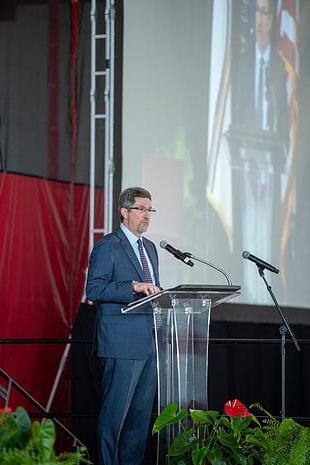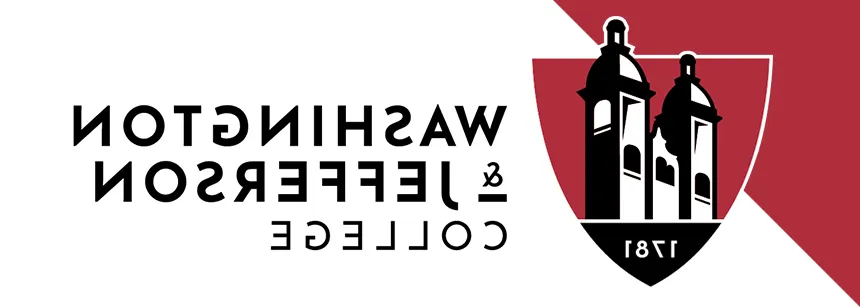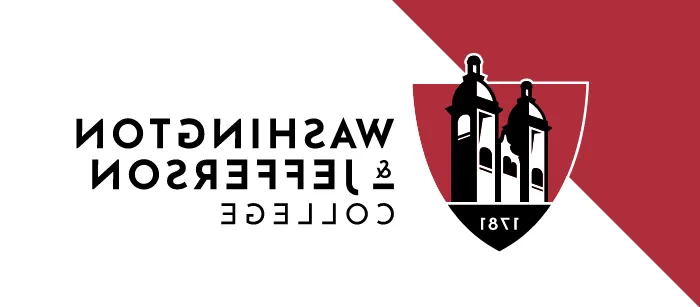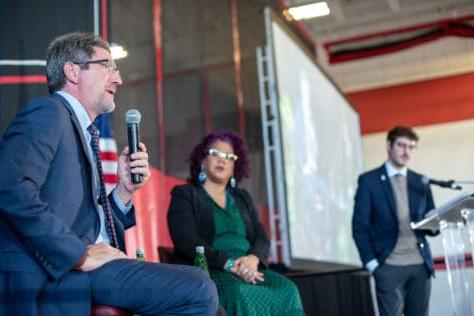WASHINGTON, PA (February 26, 2024) – Washington & Jefferson College’s (W&J) 2024 Symposium on Democracy centered around the theme, “Stepping Up: Being an Informed, Involved and Impactful Citizen,” aiming to showcase how highly engaged citizens can impact the world positively and drive meaningful change.
Held annually in February during the week of Presidents Day, the Symposium seeks to explore deeper angles and perspectives of issues that impact democracy and the way it functions around the world. It was established in 2018, during the first year of Dr. John C. Knapp’s W&J presidency.
The Symposium took place Wednesday, Feb. 21, with a variety of breakout sessions and a keynote lunch session that featured Dr. David Seigel, professor of educational leadership at East Carolina University, and Rosa Clemente, award-winning organizer, speaker, political commentator, producer, independent journalist and scholar-activist.

During his speech, Dr. Seigel stressed the importance of academic freedom and how it is essential to a healthy and functioning democratic society.
“The freedom to learn – which is, among other things – a crucial component of engaged citizenship is increasingly being challenged,” shared Dr. Seigel. “We need a broad coalition of academic freedom fighters if we’re going to preserve open inquiry in our country and on our campuses.”
Throughout his remarks, Dr. Seigel highlighted tactics and strategies of past social and political movements and how they can be applied today in what he calls “the battle for the soul of higher education.”
“While Dr. Seigel’s keynote started with an overview of the current, quite dire situation of increasingly constrained and embattled academic freedom in America today, it was followed by an inspiring overview of the wide variety and array of tactics, actions and strategies for keeping free thought alive despite apparently overwhelming political pressure,” reflected Dr. David Holiday, director of the Center for Ethical Leadership and chair of the Symposium on Democracy’s planning committee.
For Cassandra Smith ‘26, an economics and political science dual major and minor in English, her takeaways from Dr. Seigel revolved around the importance of discussions with people of differing perspectives.
“He brought up that the 1st Amendment is the lifeblood of higher education and always has been, and potential censorship in the 21st century is alarming,” she said. “I’d say everyone can agree that the world we live in is divided, made more so by the profit-fueled media. This means it is even more essential within our own institution to welcome all thoughts and points of view to the table for discussion. We must allow students to think critically about world affairs and encourage respectful disagreement.”

In her address, Clemente reflected on her experiences as a Black-Puerto Rican woman born and raised in the Bronx, New York, and how her educational experiences – and the societal events that occurred concurrently – helped to shape and direct her life’s work.
More specifically, it was Clemente’s undergraduate experience at SUNY Albany where she felt her passion and interest in the “academic life” – as she calls it – come alive.
“Taking those classes, having those professors – that’s when it started to [and] where I felt this is what I needed,” Clemente recalled.
While discussing the current state of affairs regarding social and racial injustice within America, Clemente made a passionate plea to students to be challenged and be open but not to operate in fear.
“Rosa spoke from the heart with passion and clarity about current societal injustices and her views on how we – especially students – can work in different ways to organize within our communities to resist them,” shared Dr. Holiday.
Clemente offered the following advice to be future change agents within society:
- Find someone who can challenge you
- Read books (and start a book club)
- Understand what is your politic – your identity
- Join an organization
- Don’t take it personally
“I was particularly moved by Rosa’s message about the need for self-care and community care in activism,” said Joseph Ioli ‘24, a psychology major with an emphasis in human resources management and a dual minor in marketing and conflict and resolution studies. “Her reminder that we must prioritize our own well-being to sustain our activism long-term was both insightful and empowering.”
In addition to the keynote lunch session, W&J faculty, staff and students presented at 16 breakout sessions that highlighted a range of topics, including educational rights, affirmative action, civic engagement, artificial intelligence and misinformation, geopolitics, corruption and inclusivity, among others.
“This year had the highest-ever proportion of student-designed, facilitated and led breakout sessions,” added Dr. Holiday. “In my view, this is a mark of buy-in from students – the young people whose futures we try to elevate and who have the most incentive to take democracy into their hands and make society how they believe it should be.”
Sustainability was another theme of this year’s Symposium. Dr. Holiday shared that this was “the most sustainable” Symposium on Democracy yet.
It was a deliberate focus in coordination with the W&J Sustainability Committee, which provided reusable water bottles to all keynote attendees.
Another significant sustainability measure included providing water in aluminum cans instead of plastic bottles for lunch.
“This year’s Symposium left a lasting impression as a source of inspiration – marked by its exceptional quantity of student-led sessions and environmentally sustainable measures,” concluded Ioli.
The Symposium on Democracy is fully funded by the generous support of the Guy Woodward, Jr. ‘40 Foundation.
For more information, visit www.symposiumondemocracy.org.
About Washington & Jefferson College
Washington & Jefferson College, proudly located in Washington, Pennsylvania, is a historic liberal arts college founded in 1781 that values ethical leadership, professional readiness and inclusive communities. Our highly customized and intellectually engaging student experience develops professionals of uncommon integrity to lead in an ever-changing world. For more information about W&J, visit 8nx.aifengcai.com or call 888-W-AND-JAY.



